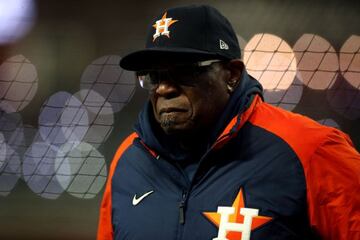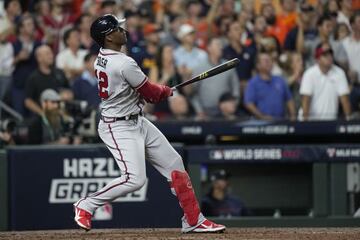The unlikely World Series win by the Atlanta Braves pits modern baseball tactics and conditioning against the raw instinct of baseball’s old guard
Jeffrey MayJeff_DiarioASUpdate: Nov 3rd, 2021 21:39 EDT

Kevin M. CoxAP
The 2021 season had so many improbables
That the Yankees wouldn’t get into the post season, nor would the Blue Jays, was unthinkable just a month ago. That Boston would be outgunned by Houston was extremely unlikely. That the Dodgers superb pitching would fall victim to the Braves bats was laughable. And yet, here we are. All of these things happened.
The Atlanta Braves went into the All-Star break with a losing record, finished the regular season with only 88 wins, out-pitched a Los Angeles Dodgers bullpen that is stacked with future hall of fame pitchers, and then followed that performance up by out-hitting the hottest batting order in MLB in the Houston Astros. To paraphrase the legendary Vin Scully, “In a season of the improbable, the impossible has happened.” The Atlanta Braves are World Series champions. The lowly, workaday, perpetually average Atlanta Braves are World Series champions.
The Braves were 44-45 at the All-Star Break.Atlanta joins the 1964 Cardinals as the only teams to go from losing record at the All-Star Break to World Series champs. pic.twitter.com/ykNMPXln1m
— ESPN Stats & Info (@ESPNStatsInfo) November 3, 2021
Modern baseball switches the focus of play
In the 21st century, the game has been calibrated toward the short-work, bullpen-hungry type of play that Houston specialize in. Short outfields and the emphasis on power hitting tends to grind through ten or more pitchers per game, sometimes seeing aces being brought in solely to get one batter out. It is a style of play that team owners and television executives love, high scoring, thrill-a-minute play where every swing of the bat is a potential knockout punch. Brute force is prized heavily over the beautiful artistry of small-ball tactical play. Everyone seems to agree and all teams have adopted this style. And into this landscape of Goliaths, strolled David.

Oct 29, 2021; Atlanta, Georgia, USA; Houston Astros manager Dusty Baker (12) makes a pitching change during the sixth inning against the Atlanta Braves during game three of the 2021 World Series at Truist Park. Mandatory Credit: Brett Davis-USA TODAY SporBrett DavisUSA TODAY Sports
With the off-season widely expected to bring the designated hitter rule to the National League, you could be forgiven for thinking that tactical, solid, basics were out of date. For the first half of the season, it certainly seemed so. Even the venerable Dusty Baker seemed to wholeheartedly endorse this view when he suddenly adopted the shifted infield back in May. Houston’s overnight success appeared to validate the move. But through it all, Atlanta remained stubbornly traditional, obstinately married to their focus on a pitching staff that featured true starters, and finding hitters under every upturned stone. They lost two stars in Mike Soroka and Ronald Acuña Jr. and made a remarkable series of trading-deadline deals to get in hitting from all quarters, picking up Joc Pederson, Eddie Rosario, Adam Duvall and Jorge Soler.

Atlanta Braves’ Jorge Soler hits a three-run home run during the third inning in Game 6 of baseball’s World Series between the Houston Astros and the Atlanta Braves Tuesday, Nov. 2, 2021, in Houston. (AP Photo/David J. Phillip)David J. PhillipAP
A celebration of time-honored fundamentals
The baseball savants assure us weekly that any baseball team that relies on small-ball tactics is anachronistic. Bases aren’t stolen, bunts aren’t lain down, pitchers shouldn’t throw 80 or 90 pitches per game. Small ball is dead, they say. But the success of the Atlanta Braves throughout the back end of the 2021 season and playoffs showed that a tactical view of the big picture can still win games, and win they did. Freddie Freeman and Austin Riley drew walks like flies, being selective with their shots and turning those shots into power. Ozzie Albies collected stolen bases throughout the season in the way that tourists collect refrigerator magnets. Their pitching staff was manned by true starters, players who would warm into a game and pitch confidently into six and seven innings every outing. AJ Minter, another of their trade deadline acquisitions, became an arm that could be trusted to bridge the two or three innings between starter and closer. After twenty years of increasingly specialized pitching across the Show, Atlanta’s resurrection of a type of pitching staff not common since the late 90s, an era of the workman, the journeyman, the pitcher who clocked in and put in a full day’s work in the office, has blown a breeze both cool and refreshing over this parched baseball landscape.
Massive strikeout of Yordan Álvarez by AJ Minter to get out of the third.Braves gonna need a lot of work from their bullpen tonight. Good news is they lead 5-0. pic.twitter.com/HLkaOBZ4w0
— Ethan Budowsky (@ethanbudowsky) October 27, 2021

